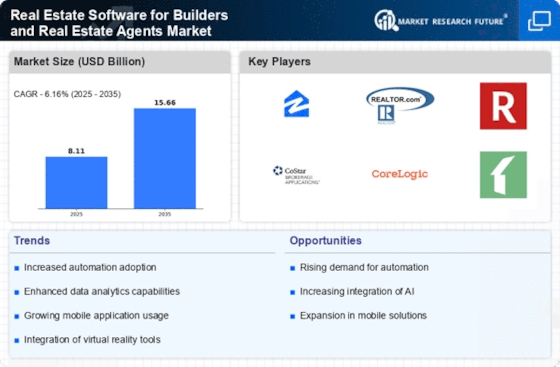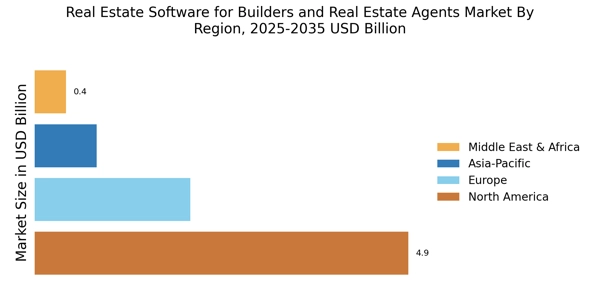Emergence of Data Analytics
The Real Estate Software for Builders and Real Estate Agents Market is increasingly influenced by the emergence of data analytics. Builders and agents are leveraging data-driven insights to make informed decisions regarding property investments and market trends. The integration of analytics tools within real estate software allows for the analysis of vast amounts of data, enabling users to identify patterns and forecast market movements. This capability is particularly valuable in a competitive landscape, where understanding consumer behavior can lead to strategic advantages. As the demand for data analytics continues to rise, software providers are likely to enhance their offerings to include advanced analytical features.
Shift Towards Remote Work Solutions
The Real Estate Software for Builders and Real Estate Agents Market is witnessing a shift towards remote work solutions. As the nature of work evolves, there is a growing need for software that supports remote collaboration and communication among teams. Builders and agents are increasingly utilizing cloud-based platforms that facilitate access to essential tools and data from any location. This trend is reflected in the rising adoption of remote work technologies, which has seen a 40% increase in usage among real estate professionals. The demand for software that enables seamless remote operations is likely to continue, as organizations recognize the benefits of flexibility and efficiency in their workflows.
Increased Demand for Digital Solutions
The Real Estate Software for Builders and Real Estate Agents Market is experiencing a surge in demand for digital solutions. As the real estate sector evolves, builders and agents are increasingly seeking software that enhances operational efficiency and client engagement. According to recent data, the adoption of digital tools in real estate has risen by over 30% in the last two years. This trend indicates a shift towards technology-driven processes, where software solutions streamline tasks such as property management, client communication, and transaction processing. The growing reliance on digital platforms suggests that companies that invest in advanced software solutions are likely to gain a competitive edge in the market.
Regulatory Compliance and Risk Management
In the Real Estate Software for Builders and Real Estate Agents Market, regulatory compliance has become a critical driver. As governments implement stricter regulations regarding property transactions and data protection, builders and agents are compelled to adopt software that ensures compliance. This necessity is underscored by the fact that non-compliance can lead to significant financial penalties and reputational damage. Software solutions that incorporate compliance features not only mitigate risks but also enhance operational transparency. The market for compliance-focused software is projected to grow, as stakeholders recognize the importance of adhering to legal standards while maintaining efficient business operations.
Growing Importance of Customer Relationship Management
Customer Relationship Management (CRM) systems are becoming essential in the Real Estate Software for Builders and Real Estate Agents Market. As competition intensifies, the ability to manage client relationships effectively is paramount. Software solutions that incorporate robust CRM functionalities enable builders and agents to track interactions, manage leads, and personalize communication. This focus on customer engagement is supported by data indicating that businesses with effective CRM systems can increase sales by up to 29%. Consequently, the integration of CRM capabilities into real estate software is likely to drive market growth, as stakeholders seek to enhance client satisfaction and retention.

















